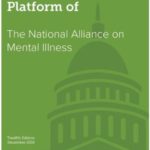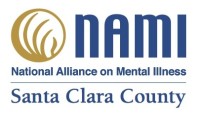The National Alliance on Mental Illness has national, state and local affiliate chapters that advocate for changes in in public attitudes towards mental illness, and for improvements in mental health policy, funding and legislation. Generally, NAMI National advocates on the national level and sets NAMI policy on mental health issues, while state NAMI offices advocate on the state level (guided by NAMI National policies). Local NAMI affiliates like NAMI Santa Clara County partner with mental health agencies at the local level to improve services and resources, and encourage their members to follow national and state advocacy guidelines and calls for member action. Learn how NAMI can help you become an mental health advocate.
How can I advocate for mental health awareness, services and support?
Join NAMI as a member and receive online NAMI National and state newsletters, mental health legislative information and calls for member action (advocacy alerts).
Find out about NAMI’s position on mental health issues.
 NAMI National Public Policy Platform – The Public Policy Platform articulates where The National Alliance on Mental Illness stands on issues related to its goal of helping individuals and families affected by mental illness build better lives.
NAMI National Public Policy Platform – The Public Policy Platform articulates where The National Alliance on Mental Illness stands on issues related to its goal of helping individuals and families affected by mental illness build better lives.
Learn more about your national, state and local mental health systems are funded, structured and resourced. Learn about national and local laws affecting persons with mental illness.
NAMI California Legislative Briefing Book – The NAMI California Briefing Book is designed to give mental health advocates a basic understanding of the funding sources for mental health in California, the agencies responsible for service delivery and capital projects, and the legislative process.
Find out how you can take action to advocate for mental health transformation. Make your voice heard regarding mental health laws, funding and services.
NAMI California Advocacy and Legislation site – NAMI California takes an active role in California’s legislative process. Each year, they select a package of legislation to support, and they also identify legislation that may negatively impact individuals with mental illness, which they will oppose or seek to amend. NAMI California makes decisions about legislation based on the NAMI guiding policy document, the NAMI California Public Policy Platform. NAMI California provides resources for local NAMI affiliates and individuals who want to impact legislation and otherwise advocate for improvements to mental health in their communities
California State Association of Counties Legislative Tracking – this non profit organization representing the interests of California’s counties has an excellent legislative tracking page. Select “Keyword” and enter “mental health” for a list of mental health related legislation.
MHSA: The Mental Health Services Act of California – More than 2 million children, adults, and seniors are affected by potentially disabling mental illnesses every year in California. Thirty years ago, the State of California cut back on its services in state hospitals for people with severe mental illnesses, without providing adequate funding for mental health services in the community. Many people became homeless. To address this issue, Proposition 63 was approved by voters in 2004. Proposition 63, also called the Mental Health Services Act, was enacted into law on January 1, 2005. It places a 1% tax on personal income above 1 million dollars; since that time, it has generated approximately $8 billion. Proposition 63 emphasizes transformation of the mental health system while improving the quality of life for Californians living with a mental illness. Prop 63 consists of the following programs: Community Services & Support, Capital Facilities and Technological Needs, Workforce Education & Training, Prevention & Early Intervention, Innovation
Santa Clara County MHSA Programs
Special Legal Topics:
Contact your local government representatives often to give them your opinions, as their constituent, about mental health issues and legislation affecting your community, state and nation.
Find your California representative
Santa Clara County Elected Officials






